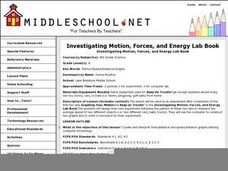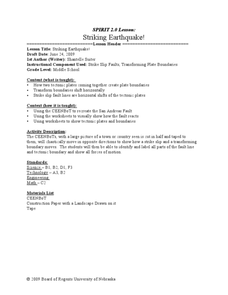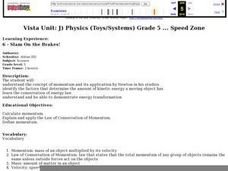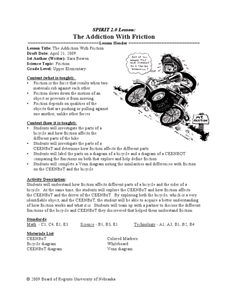Curated OER
Physics of Roller Coasters
Students design a roller coaster and demonstrate their knowledge of Potential and Kinetic Energy. They determine the average velocity a given marble travels on their roller coaster and apply their knowledge of various measurement systems...
Curated OER
The Airplane
Students demonstrate the Bernoulli Principle, review the influences that affected the Wright Brothers, and make and modify paper airplanes. This amazing lesson plan has an excellent structure, and very clear plans for the students to...
Curated OER
Investigating Motion, Forces, and Energy Lab Book
Eighth graders create their own experiements using toy trucks, cars or balls to measure the time it takes two of them to travel 5 meters, as well as at each 1 meter interval. They make use computers to make a time/distance graph and...
Curated OER
Changes in Force, Motion, and Energy
Eighth graders construct various machines and compare the work done by them.
Curated OER
Animation Flip Books
Students investigate examples of animation made from a flipbook technique in order to learn how to create their own flipbook and to learn how this process looks like an animated cartoon. In this animation lesson, students will observe...
Curated OER
Building the Car (Mechanics and Motion)
Students design and begin building a car out of K'NEX parts after a class discussion on the components of the car, the constraints and goals of the design, the type of testing that will be performed, and a demonstration of a basic...
NASA
Dark Matter NASA Conference
Young scholars calculate the escape velocity of planets in our solar system and use that knowledge to calculate the escape velocity for NGC 2300 group. They then suggest reasons for the escape velocity to be higher than possible given...
Curated OER
Simple Machines: Levers
Students discover the fundamentals and daily applications of simple machines. They practice basic engineering theory through their hands-on demonstrations of levers.
Curated OER
Scooting Along!
Students investigate how Newton's Third Law affects vehicle design. In this Newton's Third Law lesson, students use a web site to research Newton, his third law, and how to design a vehicle that uses a balloon for power. They sketch and...
PHET
Mapping the Field of a Dipole Magnet
High school scientists build their own magnetometer and use it to map the field surrounding a bar magnet. Excellent background resources is included, as well as a diagram of how to build the magnetometer.
PHET
Mapping the Ambient Magnetic Field
No GPS allowed! High school scientists continue to explore magnetic fields with a hands-on activity. After mapping the ambient magnetic field in the classroom and completing data analysis, they write about the similarities and...
PHET
The Earth as a Magnet
Everyone loves playing with magnets and iron filings. Here, young scientists first observe and then participate in an activity demonstrating magnetic fields. After completing their observations, they apply this knowledge...
Virginia Department of Education
States and Forms of Energy
Energy is just energy, right? Explain various forms of energy to your young scientists by using an interactive experiment that contains common objects to demonstrate complex concepts. Pupils conduct experiments for radiant, thermal,...
PHET
Mapping the Field of Multiple Dipole Magnets
So you built a magnetometer, now what? High school scientists use their magnetometer made in a previous lesson to map the union of magnetic fields of dipole magnets. They experiment with different alignments and draw conclusions about...
University of Colorado
Happy Landings: A Splash or a Splat?
Huygens spacecraft landed on Saturn's moon Titan in 2005, making it the farthest landing from Earth ever made by a spacecraft. In this hands-on activity, the 12th installment of 22, groups explore how density affects speed. To do this,...
PHET
Learning about Space Weather
Is the sun the only celestial body with magnetic fields? A guided discussion on the weather in space is designed with a mix of questions, discussions, explanations, and applications. Additionally, the resouce includes an...
PHET
Soda Bottle Magnetometer
Introduce learners to set of complete instructions that describe how to build a magnetometer that works just like the ones professional photographers use to predict auroras. The diagrams are wonderfully descriptive, and the written...
Curated OER
Striking Earthquake!
Students simulate strike slip faults using CEENBoTs. For this earth science lesson, students identify the fault lines and tectonic plates on a world map. They label the different parts of a fault line.
University of Colorado
Great Red Spot Pinwheel
The great red spot on Jupiter is 12,400 miles long and 7,500 miles wide. In this sixth part of a 22-part series, individuals model the rotation of the Great Red Spot on Jupiter. To round out the activity, they discuss their findings as a...
PHET
Iron Filings and Magnetic Field Lines
How do magnetic fields differ? Allow scholars to see the difference between 2-D and 3-D magnetic fields. They construct models of both and observe how they are similar and different. It is the fifth installment of an 18-part unit.
Curated OER
Slam On the Brakes!
Fifth graders study the concept of momentum and its application by Newton in his studies. They view a demonstration and complete an experiment with toy cars on a racetrack that shows them the properties of momentum and how velocity and...
Curated OER
The Addiction With Friction
Students compare and contrast where friction occurs in robots and bicycles. In this science lesson, students label the diagram of bicycle and robots. They investigate how friction affects their different parts.
Curated OER
Converging Earthquake!
Young scholars identify the fault lines and tectonic plates on the map. In this earth science lesson, students simulate landscape formation using robots. They take a quiz at the end of the lesson to demonstrate mastery.
University of Colorado
Distance = Rate x Time
Every year, the moon moves 3.8 cm farther from Earth. In the 11th part of 22, classes use the distance formula. They determine the distance to the moon based upon given data and then graph Galileo spacecraft data to determine its movement.


